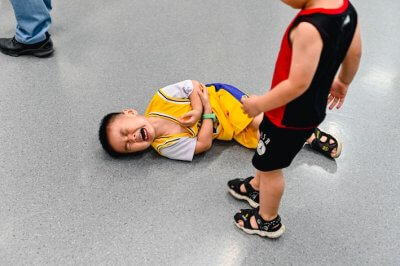Child Counselling – What are the Signs Your Kid Needs a Therapist?

By: Donnie Ray Jones
by Andrea M. Darcy
Has your kid not been acting themselves lately? Or you worry they are too different from their siblings or schoolmates? Left wondering if it’s time for child counselling?
Even before Covid-19, an NHS survey estimated that one in nine children had a diagnosable mental health disorder. This was raised to one in six during the height of the pandemic.
My child is not happy all the time
Children are not meant to be happy all the time. None of us are. Children are growing, changing, and being constantly challenged as they go, and this of course leads to some moodiness.
Just think of yourself and the last time you had to make a big change, like a new job. Did you feel anxious, stressed, overwhelmed? Get snappy with loved ones? Want to give up? Your child is no different in the face of changes and challenges.
What children need here is to feel accepted and loved no matter their mood or behaviour. If you are uncomfortable with your child’s moods, or aren’t able to handle your child unless they are ‘good’, it’s worth seeking some help with parenting. The charity Parent Talk UK offers a free helpline where you can confidentially talk to a non-judgmental parenting coach.
I am not sure who my child is
Again, often normal. Your child is developing their personality and discovering their personal strengths and weaknesses, as well as their own personal power around different people.
Each stage of personal growth presents a new challenge as well as a new chance for expansion, right up to the teenage years, where we solidify our identity. It can help parents to not panic if they learn the general stages of psychosocial growth.
So then how do I know if it’s time for child counselling?
Child counselling might be in order if there are:
- significant changes to mood and behaviour compared to your child’s personal baseline
- struggles not in just one area but in several or most areas
- a new tendency for your kids to say worrisome things that are out of character
- self-harming or violent behaviours
- ongoing medically unexplained health problems.
1. Significantly different moods and behaviours.

photo by: Brett Jordan
It’s not about comparing your child to other children. Just because one of your children has many friends and is good at school doesn’t mean the other who is shyer, and likes school less, has mental health issues.
It’s about looking for changes in personality and mood that go beyond the stage of growth they are in, and their unique personality.
For example, if your child has always been the shy child, since nursery school onward, and are struggling with now going to a new school? Then this is likely normal for their personality. But if your child was always shy and is suddenly loud and acting out in class, this is a serious red flag.
The exception here is if your child has long had behaviours that were different, and these haven’t changed, but now your child is of school age these behaviours are increasingly a problem. This could signify a learning difference or something like ADHD or autism spectrum disorder. In such cases, it’s worth seeing a child psychologist for advice.
2. Struggles in several areas of life.
Children can try to hide things, but if they are depressed or anxious it tends to affect all areas of their life.
If your eight year-old is suddenly having troubles making friends, but getting along with her siblings and her friends at church and dance class, happy at home, and in normal health? It’s more likely that she is just experiencing a social challenge over having an issue with herself.
If, on the other hand, she starts fighting with her siblings, no longer wants to attend the dance classes she used to love, and suddenly has a low appetite and is sleeping more, it’s likely there is a serious issue.
3. Saying worrisome things.
Always pay attention if your child starts verbalising negative things. This could sound like:
- saying horrible things about themselves, like calling themselves stupid, no good, or worthless
- expressing constant and increasing worries about their future
- talking about death or giving up on life
- anything to do with hurting themselves or someone else
- verbalising despair or violence.
4. Self-harm or violence.

photo by: Yang Miao
Self-harm can be subtle. Don’t overlook things like sudden hair pulling or skin picking.
And if your child is suddenly lashing out at others in physical ways, it’s a huge red flag. Not just of possible mental health issues, but also possible medical issues involving the brain. Do take it seriously and seek medical advice and/or child counselling.
5. Unexplained health issues.
Some children are introverted and respond to stress and anxiety by internalising it, until it externalises itself in physical symptoms.
If you are not currently creating a safe or calm environment for your child to ask for support, this can also be their unconscious way of getting your attention without feeling guilty for asking for it.
This might particularly be true if your family is not very open. Do you actually discuss issues, or do you brush them under the carpet and ‘get on with it’? Teaching your child to also do so? Or are you very stressed in life right now, unknowingly giving your child the idea that you don’t have time for their struggles? Parental stress directly affects children.
Medical symptoms that are unexplained by other things and might instead be stress and anxiety related include:
- constant low grade colds and flus
- upset stomach or changes to eating habits
- headaches
- random aches and pains
- sleep issues
- fatigue.
Another major sign it’s time for child counselling
Another clear indicator? When your child asks for counselling.
If your child directly asks you to get them help finding a therapist, or lets you know they would like someone else to talk to that isn’t you? Don’t brush them off.
Even if from your perspective your child is fine, even if you think maybe they are just trying to be like their friends who are in child counselling, listen. It takes a lot of courage for a child to ask a parent to help them get help. Even if it’s only a matter of one or two sessions and the therapist tells you your child is fine, it’s better than potentially overlooking a hidden trauma, or a struggle you are blinded to in your parental need to believe your child is fine.
Does my child need therapy? Or do I?
Take a deep breath and be as honest with yourself as you can, while also remembering to have self-compassion. Is it possible you need therapy, too? Or even instead of your child? Is the stress coming from your child’s exterior worlds of school and socialising, is it truly an unknown behavioural or learning issue that needs looking into? Or is the stress largely coming from their home life, of which you are part? And your own inability to listen and communicate with your child?
Or would family therapy be a good fit here? Systemic therapy, often called simply family therapy, works on the idea that none of us function alone. We are a product of the groups of people we live and engage with, and we are all responsible for each other. By working to heal as a unit, we can see bigger, better, and longer lasting changes for everyone involved.
Ready to seek help for your child and your family? We connect you with a team of highly regarded, expert child psychologists, child psychiatrists, and family therapists based in central London. Or use our booking platform to find child therapists across the UK.




